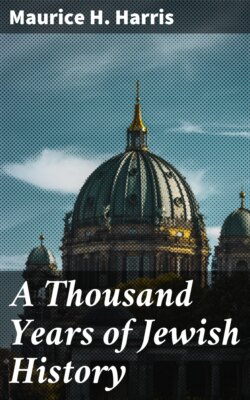Читать книгу A Thousand Years of Jewish History - Maurice H. Harris - Страница 34
На сайте Литреса книга снята с продажи.
Feast of Hanukkah.
ОглавлениеJudas Maccabeus marched to the capital and a sorry picture of desolation met his gaze. His first work was to remove all signs of idolatry and desecration. A new altar was built, the Temple was repaired and cleaned and on Kislev the 25th in the year 165, it was reconsecrated. The ceremony recalls Solomon's consecration of the first Temple; not as splendid a ceremonial perhaps, but it meant far more. Solomon's Temple had cost treasure, but this had cost blood. It was more than a civil victory; it was that least, it was a triumph of the divine cause expressed in Israel's mission. They fought for Zion as an idea rather than Zion as a city—the "Zion from which goeth forth the law." They proved again that ideals can conquer battalions. This great lesson is always brought home to us when we celebrate our festival of Hanukkah (re-dedication) instituted by the Great Council—the successor of the "Great Synagogue"—to celebrate the victory. The Syrian had been defeated. He was the enemy without. But a greater foe had to be conquered, the enemy within—religious indifference, that lurked among the Hellenist worldlings and many faint-hearted souls throughout the land.
The legend runs that when Judas Maccabeus wished to consecrate the Temple, but one flask of pure oil bearing the priestly seal had been left after the enemy's ravage. It was a measure that would last for a day, but—marvelous to tell—it served for eight, by which time new oil was prepared. The story is immortalized in the second name "Feast of Lights," given to the Hanukkah festival. The ceremony of kindling lights begins with one on the first night, continues with two lights on the second and thus progresses till the eighth and last night is reached. What is the meaning of the ceremonial and the story? It is the Maccabean victory told in symbol; for it was a story of advance from strength to strength. First, Mattathias stood alone for Judaism's cause, a solitary light. Next came his sons; then a tiny army growing instead of lessening with each conflict, from two thousand to six thousand, from six to ten, then victory crowned their efforts; and with the conquest on the field rose the faith in the hearts of the people in the same progressive way. The tiny embers became a flame, and the flame burst into a conflagration. This miracle is often found repeated in Israel's history.
The Feast of Lights is called a Minor Festival in our calendar, for reasons accidental rather than intrinsic. It is hard to institute a new observance after a religion is crystallized. It is still harder to give it the old sanction. So the rabbis did not venture then to place Hanukkah or Purim on a par with Passover, Pentecost and Tabernacles. Yet in very truth Hanukkah is a great festival. None question its authority—all are thrilled by its stirring story.
